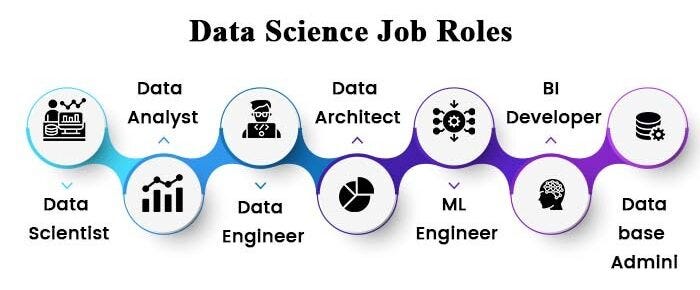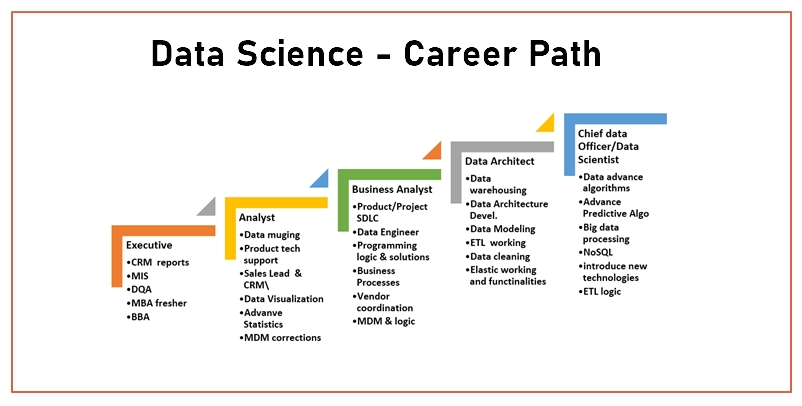Data science has rapidly become one of the most sought-after career paths in technology. It’s more than just analyzing and mining data; data scientists use programming and statistical methods to transform raw data into actionable insights. These insights are crucial for businesses to understand their return on investment (ROI) and for organizations to measure their social impact.
The field is inherently interdisciplinary, impacting nearly every facet of modern society – from optimizing grocery store inventory to analyzing political campaigns and managing crucial medical records. A career in data science offers both intellectual stimulation and the satisfaction of contributing to a constantly evolving and impactful field.
This guide explores the world of data science, covering its definition, essential skills, diverse job roles, and the steps you can take to launch your career in this exciting domain.
What is Data Science?
Data science emerged from the fields of statistics and data mining, forming a powerful intersection of software development, machine learning, research, and data analysis. Academically, it bridges computer science, business, and statistics. Data professionals build algorithms that translate complex data patterns into valuable research, informing decisions within government, businesses, and various other organizations.
The rapid advancement of information technology fuels the need for data science. The sheer volume of data generated necessitates sophisticated methods to extract meaning and drive informed actions across all sectors.
Data Science Skills
A successful data science career requires a blend of technical and soft skills. The technical skills include:
- Deep understanding of statistical analysis: This forms the bedrock of interpreting data and drawing meaningful conclusions.
- Machine learning: The ability to build and implement algorithms that allow computers to learn from data.
- Deep learning: A subset of machine learning focusing on artificial neural networks with multiple layers.
- Data visualization: The art of presenting data in a clear, concise, and compelling way.
- Mathematics: A strong foundation in linear algebra, calculus, and probability is essential.
- Programming: Proficiency in languages like Python and R is crucial for data manipulation and analysis.
- Unstructured data management: The ability to handle and analyze data that doesn’t follow a predefined format (e.g., text, images).
- Familiarity with data analysis tools: Experience with tools like SAS, Hadoop, Spark, Python, and R is highly valuable.
- Big data processes, systems, and networks: Understanding how to manage and process massive datasets.
- Software engineering: Knowledge of software development principles and practices.
Beyond technical expertise, strong interpersonal and communication skills are equally important:
- Communication skills: Clearly articulating complex findings to both technical and non-technical audiences.
- Storytelling: The ability to present data insights in a narrative format that resonates with stakeholders.
- Critical thinking and logic: Analyzing data objectively and drawing sound conclusions.
- Business acumen: Understanding business contexts and applying data insights to solve real-world problems.
- Curiosity: A constant drive to explore data and uncover new insights.
- Adaptability and flexibility: The ability to adjust to changing project requirements and technologies.
- Problem-solving: Identifying and resolving challenges related to data analysis and interpretation.
- Teamwork: Collaborating effectively with other data professionals and stakeholders.
Data Science Job Outlook
The future for data science professionals is exceptionally promising. The demand for skilled individuals continues to surge. Reports consistently highlight significant growth in the field, with numerous job openings across various sectors. The US Bureau of Labor Statistics projects substantial employment growth for data scientists in the coming years, solidifying its position as a highly desirable and lucrative career path.
Data Science Job Roles

The data science field offers a wide range of career paths, all playing integral roles in driving informed business decisions. Many of these roles often collaborate within the same team.
1. Data Scientist: Data scientists build models using programming languages like Python, transforming them into applications that solve complex problems. They work collaboratively with business analysts, data engineers, and IT architects, analyzing data and making predictions to inform strategic decisions. This role is often considered an advanced version of a data analyst.
- Skills Needed: Statistics, mathematics, machine and deep learning, programming skills, data analysis, big data processes, and tools like Hadoop, SQL, etc.
- Education: A bachelor’s degree is a common starting point, but master’s programs and data science bootcamps are increasingly important for career changers.
2. Data Analyst: Unlike data scientists, data analysts primarily use structured data to solve business problems. They utilize tools like SQL, Python, and R, along with statistical analysis and data visualization, to identify trends and generate actionable business insights. They often bridge the gap between data scientists and business analysts.
- Skills Needed: Programming languages (SQL, Python, R, SAS), statistics and math, data visualization.
- Education: A bachelor’s degree in mathematics, computer science, finance, statistics, or a related field.
3. Data Architect: Data architects design and manage the infrastructure for data management systems. They create blueprints for integrating and maintaining various data sources, ensuring that employees have access to the information they need.
- Skills Needed: Coding languages (Python, Java), data mining and management, machine learning, SQL, and data modeling.
- Education: A bachelor’s degree in data science, computer science, or a related field. Bootcamps and professional certificates can be beneficial for career switchers.
4. Data Engineer: Data engineers prepare and manage large amounts of data, developing and optimizing data pipelines and infrastructure. They make data accessible for data scientists and business analysts to use, enabling businesses to optimize their performance.
- Skills Needed: Programming languages (Java), understanding of NoSQL databases (MongoDB), and frameworks like Apache Hadoop.
- Education: A bachelor’s degree in math, science, or a business-related field is helpful. Professional certificates and bootcamps are also viable options.
5. Machine Learning Engineer: This is a more advanced role, often requiring a master’s degree or Ph.D. Machine learning engineers develop and implement algorithms that allow computers to learn from data, building and designing AI systems.
- Skills Needed: Tools like Spark, Hadoop, R, Apache Kafka, TensorFlow, Google Cloud Machine Learning Engine, data structures, modeling, quantitative analysis, and computer science basics.
- Education: Often requires a master’s degree or Ph.D. in computer science or a related field.
6. Business Analyst: Business analysts use data to provide insights and recommendations to improve company systems and processes. They identify issues within organizations and propose solutions to increase efficiency and reduce costs.
- Skills Needed: SQL, Excel, data visualization, financial modeling, data and financial analysis, business acumen.
- Education: A bachelor’s degree in economics, finance, computer science, statistics, business, or a related field.
The Path to a Data Science Career

The Path to a Data Science Career
Whether you’re a recent graduate or looking to transition from another field, here’s how to embark on a data science career:
- Build a strong foundation: Gain proficiency in programming languages (Python and R are highly recommended), statistics, and mathematics.
- Develop practical skills: Work on personal projects, participate in online courses, and contribute to open-source projects to build your portfolio.
- Consider a data science bootcamp: Intensive bootcamps offer focused training and practical experience, accelerating your learning and career prospects. Consider Melsoft Academy’s Data Science Bootcamp – Apply Now!
- Network: Attend industry events, connect with professionals on LinkedIn, and participate in online communities to expand your network and learn from others.
- Build your portfolio: Showcase your skills and projects through a well-maintained portfolio website or GitHub profile.
- Apply for jobs: Tailor your resume and cover letter to each job application, highlighting your relevant skills and experience.
The demand for data scientists is high, and the career options are diverse and rewarding. By investing time and effort in developing the necessary skills and experience, you can position yourself for success in this rapidly growing field. Don’t delay – start your journey towards a fulfilling career in data science today! Consider Melsoft Academy’s Data Science Bootcamp – Apply Now!


